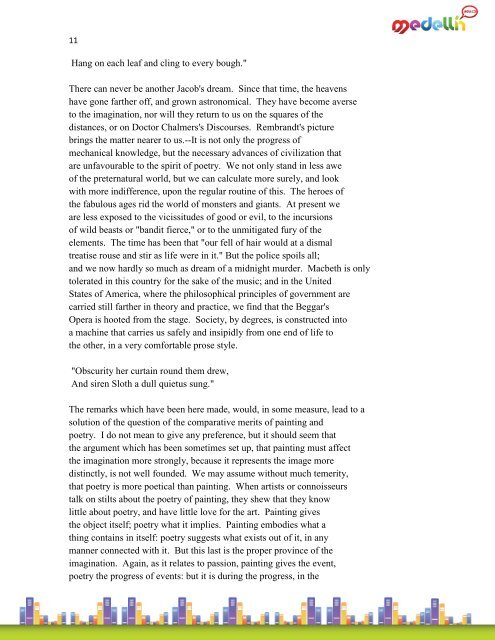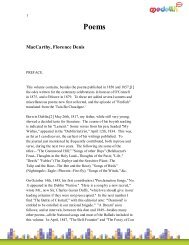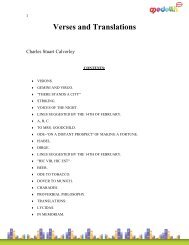Lectures On The English Poets William Hazlitt
Lectures On The English Poets William Hazlitt
Lectures On The English Poets William Hazlitt
Create successful ePaper yourself
Turn your PDF publications into a flip-book with our unique Google optimized e-Paper software.
11<br />
Hang on each leaf and cling to every bough."<br />
<strong>The</strong>re can never be another Jacob's dream. Since that time, the heavens<br />
have gone farther off, and grown astronomical. <strong>The</strong>y have become averse<br />
to the imagination, nor will they return to us on the squares of the<br />
distances, or on Doctor Chalmers's Discourses. Rembrandt's picture<br />
brings the matter nearer to us.--It is not only the progress of<br />
mechanical knowledge, but the necessary advances of civilization that<br />
are unfavourable to the spirit of poetry. We not only stand in less awe<br />
of the preternatural world, but we can calculate more surely, and look<br />
with more indifference, upon the regular routine of this. <strong>The</strong> heroes of<br />
the fabulous ages rid the world of monsters and giants. At present we<br />
are less exposed to the vicissitudes of good or evil, to the incursions<br />
of wild beasts or "bandit fierce," or to the unmitigated fury of the<br />
elements. <strong>The</strong> time has been that "our fell of hair would at a dismal<br />
treatise rouse and stir as life were in it." But the police spoils all;<br />
and we now hardly so much as dream of a midnight murder. Macbeth is only<br />
tolerated in this country for the sake of the music; and in the United<br />
States of America, where the philosophical principles of government are<br />
carried still farther in theory and practice, we find that the Beggar's<br />
Opera is hooted from the stage. Society, by degrees, is constructed into<br />
a machine that carries us safely and insipidly from one end of life to<br />
the other, in a very comfortable prose style.<br />
"Obscurity her curtain round them drew,<br />
And siren Sloth a dull quietus sung."<br />
<strong>The</strong> remarks which have been here made, would, in some measure, lead to a<br />
solution of the question of the comparative merits of painting and<br />
poetry. I do not mean to give any preference, but it should seem that<br />
the argument which has been sometimes set up, that painting must affect<br />
the imagination more strongly, because it represents the image more<br />
distinctly, is not well founded. We may assume without much temerity,<br />
that poetry is more poetical than painting. When artists or connoisseurs<br />
talk on stilts about the poetry of painting, they shew that they know<br />
little about poetry, and have little love for the art. Painting gives<br />
the object itself; poetry what it implies. Painting embodies what a<br />
thing contains in itself: poetry suggests what exists out of it, in any<br />
manner connected with it. But this last is the proper province of the<br />
imagination. Again, as it relates to passion, painting gives the event,<br />
poetry the progress of events: but it is during the progress, in the

















